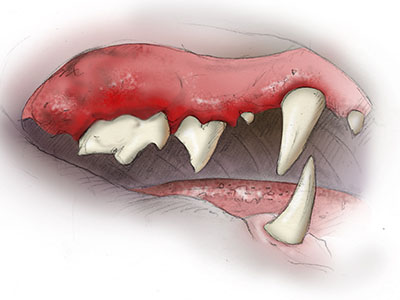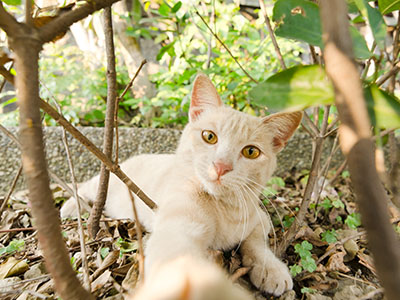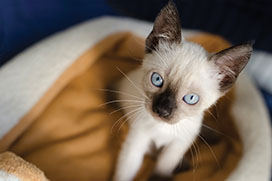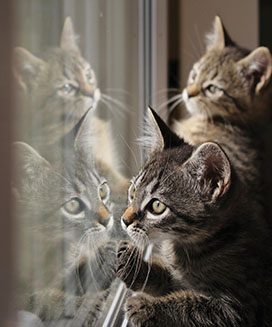Feline Immunodeficiency Virus (FIV)
Feline immunodeficiency virus (FIV) is one of the most common and consequential infectious diseases of cats around the world. In infected cats, FIV attacks the immune system, leaving the cat vulnerable to many other infections. Although cats infected with FIV may appear normal for years, they eventually suffer from immune deficiency, which allows normally harmless bacteria, viruses, protozoa, and fungi found in the everyday environment to potentially cause severe illnesses. Though there is no cure for FIV, recent studies suggest that cats with FIV commonly live average life spans, as long as they are not also infected with feline leukemia virus.
Risk and Transmission
The primary mode of transmission for FIV is through bite wounds from an infected cat. Casual, non-aggressive contact, such as sharing water bowls or mutual grooming, does not appear to be an efficient route of spreading the virus. As a result, cats in households with stable social structures where housemates do not fight are at little risk of acquiring FIV infections. Only on rare occasions, an infected mother cat may transmit the infection to her kittens. However, if the mother becomes infected with FIV during her pregnancy, the transmission risk to the kittens is increased. Sexual contact is not a significant means of spreading FIV among cats.
FIV-infected cats exist worldwide, but the prevalence of infection varies greatly. In North America, approximately 2.5-5% percent of healthy cats are infected with FIV. Rates are significantly higher (15 percent or more) in cats that are sick or at high risk of infection. Because FIV is transmitted through bite wounds, un-neutered male cats with outdoor access, especially those who are likely to fight with other cats, are at the greatest risk for FIV infection. There is currently no vaccine commercially available in North America to protect against FIV, so the best way to reduce risk is to limit contact with cats who may be infected with the disease by keeping cats indoors and testing all cats within the household.
Clinical Signs
There are three phases of infection with FIV - the acute phase, the asymptomatic (or latent) phase, and the progressive phase.
The acute phase of infection generally occurs 1-3 months after infection. At this time, the virus is carried to lymph nodes, where it reproduces in white blood cells known as T-lymphocytes. The virus then spreads to other lymph nodes throughout the body, resulting in temporary lymph node enlargement that is often accompanied by fever, depression, and lack of appetite. This phase of infection may be very mild and is often missed by owners or attributed to other causes of fever.
Following the acute phase, cats will enter an asymptomatic phase, which may last for months to multiple years. During this time, the virus replicates very slowly within the cells of the immune system, and cats will not show any outward signs of illness. Infected cats may exhibit blood work abnormalities, such as low white blood cell levels or increased blood proteins. Some cats will remain in this stage and never progress to more severe disease.
As the virus continues to spread through the immune system, cats will enter a progressive immunocompromised state during which secondary infections may occur. Most illness related to FIV is not from the virus itself, but from these secondary infections or problems with the immune system. Cats may develop chronic or recurrent infections of the skin, eyes, urinary tract, or upper respiratory tract. Inflammation of the gums and severe dental disease, known as gingivostomatitis, is common in cats infected with FIV, and they are significantly more likely to develop cancer and immune-mediated blood disorders than healthy cats. Weight loss, seizures, behavioral changes and neurological disorders are all possible. The severity of these illnesses can vary greatly, but once cats become ill with multiple critical infections or cancers, survival time is usually no more than a few months.
Diagnosis
It is important that the FIV status of all cats be determined when they are first acquired, if they become ill, and regularly if they have any risk of exposure.
When a cat is first infected with FIV, its immune system develops antibodies against the virus that persist in the blood for the rest of its life. To diagnose FIV, blood samples are examined for the presence of these antibodies. This can often be performed using a technique known as enzyme-linked immunosorbent assay (ELISA) right in the veterinarian’s office, though positive results may be confirmed using the western blot or immunofluorescence (IFA) assays at a reference laboratory.
Because these tests check for antibodies to the FIV virus rather than the virus itself, there are a few scenarios when a single test is not sufficient to determine if a cat is truly infected with FIV or not.
A negative antibody test indicates that the cat has not produced antibodies against the FIV virus and, in the vast majority of cases, indicates that the cat is not infected. There are two scenarios in which negative results may occur in infected cats. It takes the body between 2 and 6 months to develop enough antibodies against FIV to be detected, so if a cat had been infected very recently, it may test negative for FIV even though it is truly infected. If exposure is possible, it is recommended that cats are retested after at least 60 days to get a more accurate result. On very rare occasions, cats in the later stages of FIV infection may test negative on FIV antibody tests because their immune systems are so compromised that they no longer produce detectable levels of antibody.
Because few, if any, cats ever eliminate infection, the presence of antibodies indicates that a cat is infected with FIV. Because false positives are possible, it is recommended that positive results in healthy cats are confirmed using a second technique mentioned above. There are two scenarios where a positive antibody test may not represent true infection. Infected mother cats transfer FIV antibodies to nursing kittens, so kittens born to infected mothers may receive positive test results for several months after birth. However, few of these kittens actually are or will become infected. To clarify their infection status, kittens younger than six months of age that test positive for FIV should be retested at 60-day intervals until they are at least six months old. If their antibody test remains positive after six months old, they almost certainly have a true infection. FIV vaccines also cause a vaccinated cat to produce antibodies against the FIV virus that can be difficult to distinguish from those produced by a cat in response to natural infection with FIV. Cats who have been vaccinated will test positive for FIV antibodies, so it is essential to know the vaccination history if possible. There has been no commercially available FIV vaccine available in North America since 2016, so it is becoming less likely that a positive result on an antibody test is due to a previous vaccination. This vaccine is available in other countries, such as Australia, New Zealand, and Japan.
To circumvent some of these problems with testing, a polymerase chain reaction (PCR) test can be used to detect short segments of the virus’ genetic material. This tests for the presence of viral DNA itself rather than detecting antibodies against the virus. Because this method can produce relatively high numbers of false-positive and false-negative results, it is not the preferred method for screening tests but can be useful as a confirmation test in some instances.
Treatment and Management
Unfortunately, there is currently no definitive cure for FIV. However, it is important to realize that while it is impossible to predict the survival of a given cat infected with FIV, cats infected with FIV can live very normal, healthy lives for many years if managed appropriately. Once an FIV infected cat has experienced one or more severe illnesses as a result of infection, however, or if persistent fever and weight loss are present, the prognosis is generally less favorable.
For a healthy cat diagnosed with FIV, the most important management goals are to reduce their risk of acquiring secondary infections and prevent the spread of FIV to other cats. Both of these goals are best met by keeping cats indoors and isolated from other cats. Spaying and neutering will eliminate the risk of spreading FIV to kittens or through mating and will reduce the tendency of cats to roam and fight if they do get outside. They should be fed nutritionally complete and balanced diets, and uncooked food, such as raw meat and eggs, and unpasteurized dairy products should be avoided to minimize the risk of food-borne bacterial and parasitic infections.
Wellness visits for FIV-infected cats should be scheduled at least every six months. The veterinarian will perform a detailed physical examination of all body systems with special attention to the health of the gums, eyes, skin, and lymph nodes. Weight will be measured accurately and recorded, because weight loss is often the first sign of deterioration. A complete blood count, serum biochemical analysis, and a urine analysis should be performed annually.
Vigilance and close monitoring of the health and behavior of FIV-infected cats is even more important than it is for uninfected cats.
Because most illness in FIV-infected cats is the result of secondary infections, it is very important that cats be promptly evaluated and treated when any signs of illness occur. These cats may require longer or more intense treatments and courses of antibiotics than cats without FIV. For routine procedures such as dental therapy or surgery, antibiotics may be recommended to help prevent secondary infections from taking hold.
Treatment for the virus itself is limited and mostly use drugs developed for treatment of Human Immunodeficiency Virus. Zidovudine (AZT) treatment can help cats with severe dental inflammation (stomatitis) or neurologic disease, but has not been shown to prolong survival in FIV-infected cats and can have serious side effects. There is significant ongoing research investigating different combination antiviral therapies to treat FIV.
Prevention
The only sure way to protect cats is to prevent their exposure to the virus. Cat bites are the major means by which infection is transmitted, so keeping cats indoors, away from potentially infected cats that might bite them, markedly reduces their likelihood of contracting FIV infection. To reduce the chance of indoor cats becoming infected, it is ideal to assure that only infection-free cats are brought into a household occupied by uninfected cats. In some cases, separation of infected from non-infected cats is possible in a household, and this is ideal if infected cats must be brought into occupied by non-infected cats.
Unfortunately, many FIV-infected cats are not diagnosed until after they have lived for years with other cats. In such cases, all the other cats in the household should be tested. Ideally, all infected cats should be separated from the non-infected ones to eliminate the potential for FIV transmission. It is important to realize, however, that since FIV is transmitted primarily by bite wounds, transmission from an infected cat to an uninfected cat is much less likely in households that have stable social structures (i.e., households in which cats do not fight).
FIV will not survive for more than a few hours in most environments. However, FIV-infected cats are frequently infected with other infectious agents that may pose some threat to a newcomer. For these reasons, to minimize transmission of FIV and other infectious diseases to a cat that is brought into an environment in which an FIV-positive cat has lived, prudence dictates a thorough cleaning and disinfection or replacement of food and water dishes, bedding, litter pans, and toys. A dilute solution of household bleach (four ounces of bleach in 1 gallon of water) makes an excellent disinfectant. Vacuuming carpets and mopping floors with an appropriate cleanser are also recommended. Any new cats or kittens should be properly vaccinated against other infectious agents before entering the household.
Human health concerns
Although FIV is similar to human immunodeficiency virus (HIV) and causes a feline disease similar to acquired immune deficiency syndrome (AIDS) in humans, it is a highly species-specific virus that infects only felines. There is currently no evidence that FIV can infect or cause disease in humans.
Last updated 2021









